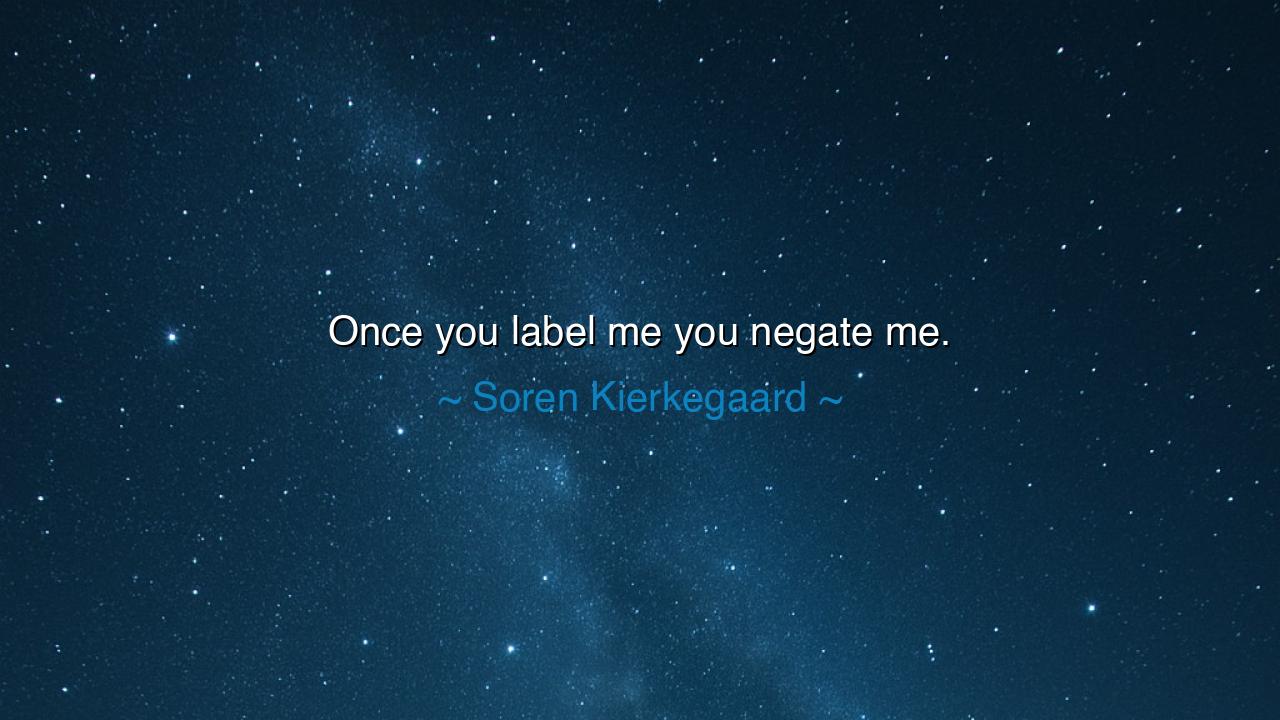
Once you label me you negate me.






The words of Søren Kierkegaard, “Once you label me you negate me,” ring with the power of a timeless warning. He speaks against the prison of labels, which reduce the vastness of a human soul to a single word, a single box, a single definition. To be labeled is to be diminished, for every person contains multitudes—dreams, contradictions, mysteries—that no single word can ever capture. In reducing a man to a label, we strip away his freedom, his individuality, his depth, and leave only a shadow of who he truly is.
The ancients understood this danger well. Socrates himself resisted being called a “sophist,” though he was a teacher of wisdom, because the label carried chains of misunderstanding. To live truly, he believed, was to remain open to growth and change, never confined to categories imposed by others. Kierkegaard, like Socrates, feared that society’s urge to name and define was an act of control, a way of negating the living truth of the self. For the soul is not static; it is ever-becoming.
History gives us witness in the life of Galileo Galilei. He was labeled a heretic by the Church, though in truth he was a seeker of knowledge, peering into the heavens for truth. That label—heretic—negated his true calling as a scientist, silencing his voice for years. Yet history vindicated him, proving Kierkegaard’s wisdom: labels serve the powerful for a time, but they cannot contain the vastness of truth.
Kierkegaard’s cry is also a defense of human freedom. To negate a man by labeling him is to deny him the right to define himself, to move beyond what others expect. The artist who is called “mad,” the reformer who is called “radical,” the prophet who is called “fool”—all are reduced by their labels, yet their greatness lies precisely in breaking free of them. True existence, Kierkegaard teaches, is lived authentically, not within the confines of names given by others.
Let the generations remember: no man or woman is a single word. The soul is a river, flowing and changing, deeper than any category can describe. Beware the ease of labels, for in naming too quickly, we blind ourselves to the infinite richness of another. And beware of accepting labels placed upon you, for in doing so, you betray your own freedom. To live fully is to resist negation, and to insist upon being more than any word can contain.






Ttung
Online, categorization is automated: algorithms slot us into interest clusters, political segments, and risk scores. It’s efficient but brittle, and it travels with you across contexts you never consented to. What countermeasures would restore agency—user-editable profiles, expiration dates on tags, context labels visible on posts, or “why am I seeing this?” explanations by default? And on the human side, how do we practice curiosity that resists snap tagging in comment wars? I’m looking for norms and designs that widen, not narrow, personhood.
PGpro gamer
From a clinical angle, diagnostic words can unlock services, community, and self-understanding—yet they can also attract stigma or excuse systems from adapting. When is a label life-giving versus limiting for neurodivergent or chronically ill folks? Should we prefer terms that describe needs and strengths over fixed identities, or is personal identification part of healing? I’m curious how to design forms, classrooms, and workplaces that use categories to direct resources while preventing gatekeepers from mistaking paperwork for the person in front of them.
PAThai Pham Anh
In workplaces, labeling shows up in performance reviews and hallway lore: “high potential,” “difficult,” “culture fit.” Those tags travel faster than explanations and quietly shape opportunities. How can managers keep necessary heuristics from becoming self-fulfilling cages? I’d prefer behavior-based notes, time-bounded judgments, and explicit space for counterevidence. Also, what responsibilities lie with the labeled person—should we proactively narrate our growth to overwrite stale shortcuts, or is that unjust emotional labor? I want a practical protocol that honors nuance without paralyzing decisions.
TTLuong Ta Thi
Philosophically, I hear a warning about how categories flatten persons. Naming organizes reality, but it also exerts power: what’s convenient for the classifier can be constricting for the subject. At the same time, language is how we coordinate and care; we can’t abandon descriptors entirely. Is there a test that separates respectful shorthand from reduction? Maybe labels should be provisional, plural, and co-authored—“for this context, for now.” How do we keep identity open-ended while still communicating efficiently in the messy world of groups and institutions?